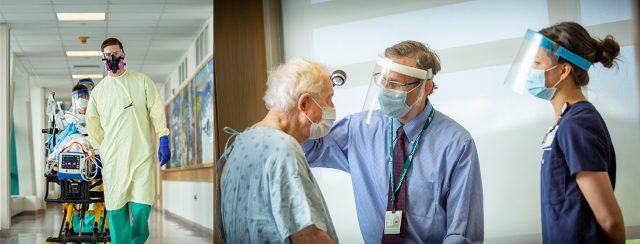As of July 1, 2020, the Dermatology Section of the Department of Surgery, and the Emergency Medicine Section of the Department of Medicine are now full, autonomous, academic departments, a status granted earlier this year by the Dartmouth-Hitchcock (D-H) Board of Trustees and the Dartmouth College Board of Trustees. Having demonstrated capacity to scale and deliver excellent academic experiences, the new departments are set to gain advantages in teaching, research, professional recruitments and patient care.
Emergency Medicine Chair Scott W. Rodi, MD, MPH, explains that those advantages will come, in large part, from the recruitment advantages that a department status brings. “Physicians who are going to dedicate their lives to an academic career in Emergency Medicine, for example, want to know they have an academic home in the form of an independent department,” notes Rodi. “We’ll be able to recruit and retain strong physicians who want an academic career in a department that has a voice in the institution.”
Recruitment advantages also extend to residents. “As a department, we have the autonomy to create new, specialty academic clinics,” says Dermatology Chair M. Shane Chapman, MD. “That’s important for residents who are interested in niche areas like pediatric dermatology or lymphoma of the skin or multi-disciplinary work like dermatology psychiatry.” The Department of Dermatology is also modifying rotation schedules to accommodate a greater number of students from the Geisel School of Medicine at Dartmouth.
Rodi anticipates that, in time, several specialty areas in the Department of Emergency Medicine will build enough capacity to become department sections. “We currently have clinical programs in ultrasound, wilderness/austere medicine, telemedicine, geriatric emergency medicine, EMS, critical care and in other areas. As a full academic department, we envision attracting a larger number of residents, fellows and physicians.”
“Dartmouth-Hitchcock is excited by the addition of the Department of Emergency Medicine and the Department of Dermatology to our impressive group of thirteen other clinical departments and centers,” said Dr. Susan Reeves, RN, Executive Vice President for Research & Education at Dartmouth-Hitchcock. “The new departments already sponsor impressive residency training programs as well other professional and para-professional education programs that train clinicians and support staff in their medical specialties. In addition, the departments of Dermatology and Emergency Medicine both host solid programs in clinical, translational and basic research. The elevation of these specialty Sections to Department status provides them the launch pad to further elevate their work onto the national stage, as well as positions them to be magnets for top talent in the field. We all look forward to the many contributions these two departments will make to our patient care, educational and discovery missions.”
“These new departments now establish the academic homes for the faculty, staff and learners to appropriately reflect their important contributions to patient care and the unique training programs that they support,” says Duane Compton, PhD, dean of the Geisel School of Medicine. “This is a major step toward supporting the academic identities of all of the care providers and support personnel in these clinical disciplines.”
Adds Rodi, “As a department, we can participate in and gain access to new networks and databases, and will participate directly in organizations that set the standards for academic departments nationally.”
Department status will increase Emergency Medicine and Dermatology opportunities for philanthropic funding that directly supports specialty clinics and research, which will, in turn, further strengthen recruitment and retention of high caliber physicians, residents and students and translate into improved patient care. “We’ve been working toward this for a long time,” says Chapman. “The transition from section to department will make our teams and Dartmouth-Hitchcock even better.”
About Dartmouth-Hitchcock Health: Dartmouth-Hitchcock Health (D-HH), New Hampshire’s only academic health system and the state’s largest private employer, serves a population of 1.9 million across northern New England. D-HH provides access to more than 2400 providers in almost every area of medicine, delivering care at its flagship hospital, Dartmouth-Hitchcock Medical Center (DHMC) in Lebanon, NH. DHMC was named in 2019 as the #1 hospital in New Hampshire by U.S. News & World Report, and recognized for high performance in 13 clinical specialties and procedures. Dartmouth-Hitchcock also includes the Dartmouth-Hitchcock Norris Cotton Cancer Center, one of only 51 NCI-designated Comprehensive Cancer Centers in the nation; the Children's Hospital at Dartmouth-Hitchcock, the state’s only children’s hospital; affiliated member hospitals in Lebanon, Keene, and New London, NH, and Windsor, VT, and Visiting Nurse and Hospice for Vermont and New Hampshire; and 24 Dartmouth-Hitchcock clinics that provide ambulatory services across New Hampshire and Vermont. The D-HH system trains nearly 400 residents and fellows annually, and performs world-class research, in partnership with the Geisel School of Medicine at Dartmouth and the White River Junction VA Medical Center in White River Junction, VT.
Founded in 1797, the Geisel School of Medicine at Dartmouth strives to improve the lives of the communities it serves through excellence in learning, discovery, and healing. The Geisel School of Medicine is renowned for its leadership in medical education, healthcare policy and delivery science, biomedical research, global health, and in creating innovations that improve lives worldwide. As one of America’s leading medical schools, Dartmouth’s Geisel School of Medicine is committed to training new generations of diverse leaders who will help solve our most vexing challenges in healthcare.
